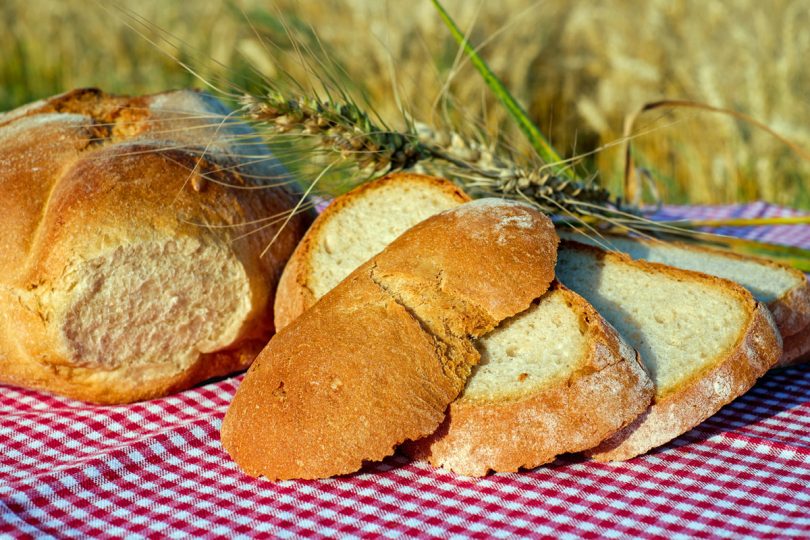Each week, Moravians across the U.S., Canada and the Caribbean share a common message through their Sunday bulletins. This month, we share insights written on John 6:51-59. Thanks to writers past and present for their contributions to the Moravian bulletin series.
John 6:51-59
New Revised Standard Version
“I am the living bread that came down from heaven. Whoever eats of this bread will live forever; and the bread that I will give for the life of the world is my flesh.”
The Jews then disputed among themselves, saying, “How can this man give us his flesh to eat?” So Jesus said to them, “Very truly, I tell you, unless you eat the flesh of the Son of Man and drink his blood, you have no life in you. Those who eat my flesh and drink my blood have eternal life, and I will raise them up on the last day; for my flesh is true food and my blood is true drink. Those who eat my flesh and drink my blood abide in me, and I in them. Just as the living Father sent me, and I live because of the Father, so whoever eats me will live because of me. This is the bread that came down from heaven, not like that which your ancestors ate, and they died. But the one who eats this bread will live forever.” He said these things while he was teaching in the synagogue at Capernaum.
Done with Jesus?
John D. Rights, pastor • Konnoak Hills Moravian Church, Winston-Salem, N.C. • Aug. 22, 2021
John 6:56–69 is as much about what was happening in the day it was written as it is about the day it remembered. Writing 70 years or so after the Jesus Movement emerged in Galilee, John teaches a lesson on Holy Communion when Jesus says: “Those who eat my flesh and drink my blood abide in me, and I in them. . .Whoever eats me will live because of me. . .The one who eats this bread will live forever.”
The T-shirt version could read, “Eat mo’ Jesus.” Repugnant to some. Offensive to others. Appealing to a few. And all might agree with the many disciples who said, “This teaching is difficult, who can accept it?”
Many couldn’t. Sounded too cannibalistic. Disregarded the Law of Moses. Nothing about this in the Scriptures. So they turned their backs to Jesus, following no longer.
But others, such as Simon Peter, had tasted his new wine. (John 2)
Their thirst had been quenched by his living water. (John 4)
Their hunger had been satisfied by his bread of life. (John 6)
Their hearts had been stirred by his words of eternal life.
And the Divine Life they received by believing in him kept them on his course.
This passage is also as much about what is happening in our days, in our lives, as it is about what was happening in the days it was written and on the day it remembers. Jesus’ teachings on love and grace, forgiveness and nonviolence, wealth and social boundaries, are at least as difficult as the teachings on Communion we find in John. It would be easier to be “done with” Jesus than to follow. But where would we go? Where else could we go for the Life he gives and the Life he is?
“You have the words of eternal life”
Staci Marrese-Wheeler, pastor • Lakeview
Moravian Church, Madison, Wis. • Aug. 26, 2018
In her spiritual memoir Take This Bread, Sara Miles begins with the account of her first communion. She was forty-six years old; until she ate the bread and drank the cup of that communion meal, she had lived a “secular life, at best indifferent to religion.” Her first communion meal was her moment of conversion to a life of Christian discipleship.
Miles writes, “Eating Jesus, as I did that day, to my great astonishment, led me against all my expectations to a faith I scorned and work I’d never imagined.” Through that encounter with Christ, she realized that the work she was being called to in life was feeding people through the creation of food pantries.
It stopped me in my tracks when I first read it: “eating Jesus.” It made me uncomfortable.
Yet it was in eating real food, bread and wine, that Sara Miles was struck with a spiritual awakening. Through it, she understood Jesus as the Bread of Life, who feeds people and who called her to do the same. She had to consume the Bread of Life, literally and figuratively, to understand the life she could have through him.
The disciples didn’t like the thought of “eating Jesus” either. Jesus told them, “I live because of the Father, so whoever eats me will live because of me” (John 6:57). This teaching of Jesus offended them. Some of them quit following him. The twelve stayed. Later, after his resurrection, Jesus told his disciples, “Feed my sheep.” (John 21:17). Once they ate the bread of life, they were called to feed it to others.
I met Sara Miles once, and she signed my copy of Take This Bread. She wrote, “Many blessings on your work feeding people.”
Bread of Life
Betty Helms, ministerial candidate, Friedberg Moravian Church, Winston-Salem, N.C. •
Aug. 26, 2012
Christ is the “Bread of Life” and those who believe in him have “everlasting life.” Jesus made it abundantly clear (John 6:53–58) that those who believe will “eat the bread” and “drink the cup.”
In order rightly to discern the body and blood, we need to understand the symbolism behind each. Jesus states, in the partaking of the bread and cup, “Take, eat; this is my body which is given for you. . .Drink from this, all of you; this is my blood of the new covenant, which is shed for you and for many for the forgiveness of sin. . .Do this in remembrance of me.”
But what is Jesus calling his disciples to remember? In partaking of the bread and the cup, in a spiritual sense we receive the body and blood of Christ. This does not mean that bread and wine literally turn into flesh and blood. Rather, this is a moment of holy remembrance and individual intimacy when we consume the bread and the cup (1 Corinthians 10:16).
As disciples of Christ, as we receive “the bread” (Jesus’ flesh) and “the cup” (Jesus’ blood), we receive publicly “Christ the Bread of Life,” and we receive his forgiveness of sin brought forth in the new covenant. As we receive the Lord’s Supper, we in remembrance receive spiritual nourishment that brings personal intimacy with our Lord and Savior Jesus Christ! Remembering Jesus, we feed our spirit with his “body and blood.”
This receiving of “the Supper” is spiritually nourishing to our inner heart, body, mind, and soul—in much the same way that baptism spiritually cleanses us. When we receive “the bread and the cup,” our hearts need to receive them remembering God’s great love for us. We need to come to the Table with repentant hearts that are spiritually hungry for the nourishment that can be found only in Christ, the Bread of Life.
True food and true drink
Ray Burke, pastor • Clemmons Moravian Church, Clemmons, N.C. • Aug. 16, 2009
“Those who eat my flesh and drink my blood have eternal life, and I will raise them up on the last day; for my flesh is the true food and my blood is the true drink” (John 6:54-55). The people who first heard Jesus, who like Jesus were Jews, were scandalized by his words. But Christians through the ages have also been deeply troubled by them. Their exact meaning has been difficult to grasp or accept. Thus, they have been the source of misunderstanding, division, and conflict. Even today theologians and scholars continue to argue over them.
Regardless of our understanding of the terms as literal or figurative, Jesus’ original intent, or any of the other debates raging around this text, we must finally accept the fact that, for most people today, these words relate to Holy Communion. Jesus could not have been clearer. No one can hear or read his words and doubt their importance. Consequently, we should never doubt the importance of Holy Communion. And yet we do!
Oh, we’d never say that we do. Yet our practices often betray our attitudes. Sometimes we even seem to assign Communion to the position of second-class worship. Thirty years ago I first noticed that attendance at Holy Communion services was almost always less than at a regular worship service. And this is still true today! When I ask people why, the most common responses I receive are (1) “It’s not ‘preaching’”; (2) “I do it once or twice a year, and that’s enough”; (3) “It’s just ‘too high church’ or ‘too Catholic’”; and (4) “It just doesn’t make sense to me” or “I don’t really understand it.” These responses indicate a serious need for some personal spiritual growth and Christian education.
After baptism, Holy Communion is the most sacred thing we do in worship. It is the holiest act in which we participate on a regular basis. We need to recover the awe and wonder of it. We need to reexamine its meaning in the context of our faith. And we may begin with today’s Gospel.
We also need to remember that Holy Communion is not something we created. Rather it was instituted by our Lord Jesus Christ, when he said, “Do this in remembrance of me.”







